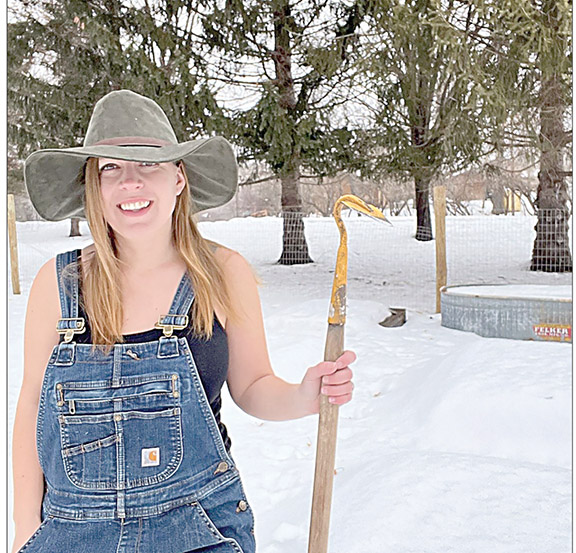
By TRISTAN JENSEN
Editorial Assistant
Homesteading is New Richland area resident Christa Wadekamper's full-time job. As part of it she sells eggs and sourdough bread, and has an online store for handcrafted items at barefootlanemn.com.
Wadekamper spoke about her experiences and the rationale behind them during an event at the New Richland Public Library on March 16.
Barefoot Lane is the name of Wadekamper's homestead, located about five miles south of Waseca. Surprising the moderate audience, the homestead is just under three acres in size, which ties directly to a major theme of her address – anyone can homestead. Wadekamper says she's the “type of person” who made the decision to raise ten turkeys because she realized a year in advance that she wanted to have turkey legs for Christmas dinner, but she's also an advocate of the idea that a person's circumstances shouldn't prevent them from living part or all of a homesteading lifestyle if it suits them. To her, homesteading means living with the land, not just on it, cooking and baking from scratch as much as possible, raising and farming personal food sources, and finding local sources for those items that can't be produced at home. To that end, she says, even someone living in an apartment can homestead. Wadekamper did it herself. She made use of “container gardening,” or growing food plants indoors in standalone containers, as well as community garden spaces. She also recommends farmers' markets. She reminded the gathered listeners that a person can hunt, fish and forage on state- or family-owned land. In addition to gardening and raising animals, Wadekamper says homesteading can mean using practical skills – crafting items, or repairing damaged or aging equipment before buying replacements.
Wadekamper grew up on her family's farm outside Faribault; she graduated from Faribault High School. She is the daughter of Tim Wadekamper and Sharon Becker and has two sisters, Cassie Jensen and Amy Wadekamper, as well as two step-siblings, Ben and Jessica Anderson. She is married to Jesse Rugroden, and they have a son, Oliver.
“Community is key,” Wadekamper said about the parts of homesteading that a person can't or won't do themselves. “Won't” is a key word, because Wadekamper also advocates that a person shouldn't force themselves into things that don't work for them. She says her biggest regret in life is pursuing a degree in accounting. “Once I started the classes, I knew I didn't want to be an accountant, but was afraid to change to something else,” she explained. “Now I tell people: Don't do what you are ‘supposed to’ do; do what drives you, brings you joy, and fulfills you.” This philosophy extends into her life as a homesteader as well; Wadekamper told her audience that she'd tried making homemade household cleaners and found it wasn't for her, so now that's something she buys. Another piece of advice Wadekamper gave is not to fear failure, since that fear can be a barrier to success. She also advised facing failures with candid honesty, so that others have a chance to learn from them or share knowledge to help in recovering from them. “Nowadays there is no reason not to learn things,” she said. “'Google it,' is one of my favorite phrases.” In addition to online research, Wadekamper suggests taking classes offered through community resources or the DNR, utilizing libraries, and reaching out to community members about their areas of expertise.
Wadekamper says she homesteads because it's important to her that her family knows where their food comes from, knows the animals were treated well during their lives, and can be confident they have as low a carbon footprint as possible. The skills she uses homesteading are also things she grew up doing. Wadekamper was the fourth generation to live on the family farm, and though it had shrunk to a hobby farm by the time she was around, she learned hunting and fishing from her dad, and gardening and canning from her mom. As a child, she remembers duck hunting in the mornings with her dad before he'd take her to daycare on the four-wheeler. The family also sold strawberries from their fields, so Wadekamper says she's always been familiar with feeding other people.
